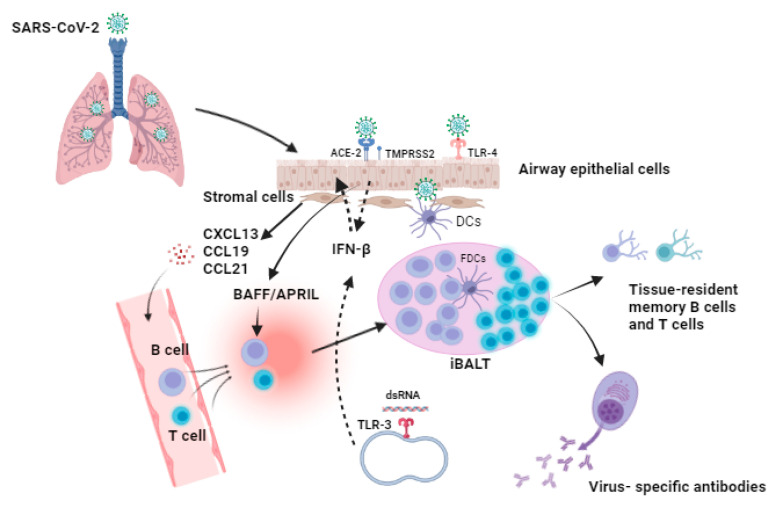Figure 1.
Proposed model for the formation of inducible bronchus-associated lymphoid tissue (iBALT) after SARS-CoV-2 infection. SARS-CoV-2 infection is initiated when the SARS-CoV-2 spike protein interacts with the angiotensin-converting enzyme two (ACE-2) receptor that is expressed on the surface of airway epithelial cells, and another essential host cell factor is the transmembrane protease serine 2 (TMPRSS2), which enhances the interaction of the spike protein with the receptor and facilitates the entry of the virus into the host cells. Additionally, toll-like receptor-4 (TLR-4) can recognize the spike protein of the virus, and endoplasmic TLR-3 can identify the viral double-stranded RNA (dsRNA) during replication. The host interaction with the virus may lead to the activation of type-1 interferons (IFNs) such as IFN-β, which can act as an antiviral agents to inhibit the viral replication and induce an antiviral state in the neighboring cells. Moreover, infected host cells produce a wide range of inflammatory cytokines and chemokines that can activate and recruit many immune cell types at the site of infection. They can activate dendritic cells (DCs) as well as stromal cells. Furthermore, during SARS-CoV-2 infection, local inflammation is initiated in the lung. Resting stromal cells, including fibroblasts, lymphatic cells, and vascular endothelial cells, are considered major sources that can produce homeostatic chemokines, such as CXCL13, CCL19, and CCL21, which further mediate the formation and maintenance of iBALT in the lungs via the facilitating and recruitment of B and T cells to the site of infection, where they can accumulate and arrange in a follicle germinal-like structure. In addition, follicular dendritic cells (FDCs) are located in the B-cell follicle, present specific antigens to the B cells, and enhance co-stimulatory signaling. Thus, FDCs are important in the maintenance of iBALT during infection. Furthermore, the cytokines BAFF and APRIL can be produced by airway epithelial cells upon viral infection and may support local B cell response, activation, differentiation, and antibody class switching that results in the production of specific antibodies against SARS-CoV-2 in the lungs, as well as the generation of memory B and T cells that can last for a long period of time.

